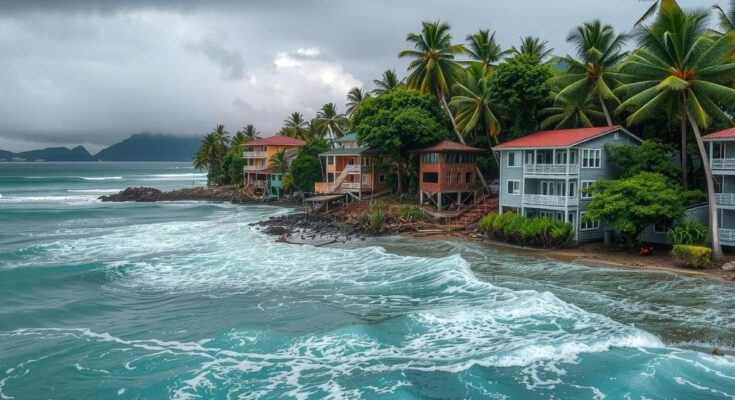Mayotte is grappling with severe challenges as Tropical Storm Dikeledi struck shortly after Cyclone Chido caused significant devastation. The storms have led to loss of life, injuries, widespread flooding, and infrastructure damage. There is increasing frustration among residents over the lack of adequate response and support from the French government, emphasizing ongoing issues surrounding disaster preparedness and investment in the territory.
On January 12, Mayotte, one of France’s most economically challenged overseas departments, experienced significant turmoil as Tropical Storm Dikeledi struck, compounding the destruction caused by Cyclone Chido just weeks prior. The storm unleashed torrential rainfall and strong winds across the archipelago, leading to the issuance of a red alert and advisories for residents to remain indoors, according to reports by Caliber.Az. The island is still reeling from the aftermath of Cyclone Chido, which caused the tragic loss of 39 lives, injured 5,000 people, and left an alarming 200 individuals unaccounted for.
These events have strained Mayotte’s already fragile infrastructure, with critical facilities such as the international airport rendered inoperable and numerous residents displaced from their homes. The plight of those living in makeshift settlements, particularly around the town of Mamoudzou, is dire as thousands continue to face homelessness. Despite the French government pledging support, residents express mounting frustration over perceived neglect, highlighting a lack of adequate investment and preparedness for natural disasters that have long been systemic issues in the region.
President Emmanuel Macron’s visit to the island after Cyclone Chido was met with skepticism, as many denizens of Mayotte voiced their demands for more substantial governmental intervention and resources. The series of calamities underscores the inadequacy of France’s response to the urgent needs of its overseas territories, particularly in the face of climate change and increasing severe weather events.
As the storm leaves behind both immediate destruction and long-term challenges, it calls for prompt and significant investment in disaster resilience and infrastructure. Addressing these vulnerabilities is critical for the protection and future stability of Mayotte’s residents amidst a growing climate crisis.
The island of Mayotte has faced significant challenges as it is categorized as the poorest overseas department of France. It has been subjected to natural disasters, particularly tropical storms and cyclones, which have exposed the weaknesses in its infrastructure and emergency response systems. The impact of Cyclone Chido still lingers, leaving a toll that includes loss of life, injuries, and homelessness. The recurring devastation raises serious questions about the adequacy of governmental support and the historical neglect of the region by French authorities, particularly in terms of disaster preparedness and resilience.
The unfolding crisis in Mayotte due to Tropical Storm Dikeledi, following the devastation of Cyclone Chido, highlights critical shortcomings in disaster management and governmental support. The people of Mayotte face immediate threats to their safety and long-term challenges regarding infrastructure and resilience against future disasters. It is imperative that significant and sustained investments be made to address these pressing needs, ensuring that the residents can withstand and recover from the impacts of climate change and extreme weather events.
Original Source: caliber.az




